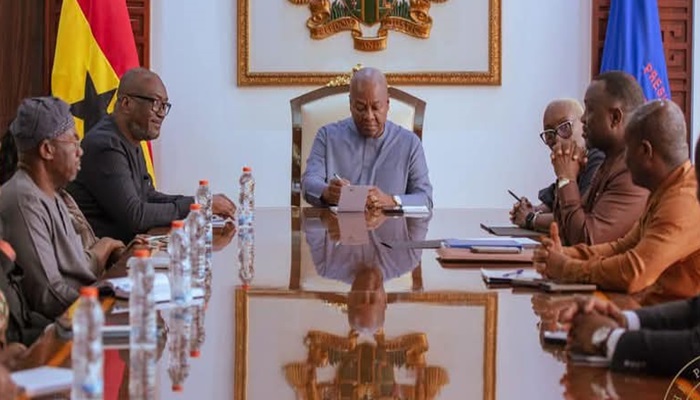
President Mahama Holds Stakeholder Consultation With Constitution Review Commission to Discuss Key Constitutional Reforms
President John Dramani Mahama recently held a crucial stakeholder consultation with the Constitution Review Commission to discuss key constitutional reforms aimed at strengthening Ghana’s governance framework. The meeting brought together legal experts, political leaders, civil society organizations, and traditional authorities to deliberate on significant changes needed to enhance democracy, accountability, and national development. Key topics included decentralization, electoral reforms, separation of powers, and human rights protections. This consultation highlights the government’s commitment to inclusive decision-making, ensuring that constitutional amendments reflect the needs and aspirations of the people. In this blog, we explore the major reforms discussed, the role of stakeholder engagement, and the potential impact these changes could have on Ghana’s democratic future.
Key Constitutional Reforms Discussed During President Mahama’s Stakeholder Consultation With the Review Commission
During President Mahama’s stakeholder consultation with the Constitution Review Commission, several key constitutional reforms were discussed to strengthen Ghana’s democratic governance. One of the major topics was the decentralization of power to enhance local governance and decision-making. The discussion highlighted the need to empower local authorities by granting them more autonomy, improving service delivery, and fostering grassroots participation in governance. Additionally, there was emphasis on electoral reforms to ensure transparency, fairness, and efficiency in future elections. Proposals included reviewing the appointment process of the Electoral Commission and enhancing mechanisms to prevent electoral disputes. Another critical reform discussed was the separation of powers and the need to strengthen independent institutions. Stakeholders raised concerns about the balance of power between the executive, legislative, and judicial branches, with proposals to limit executive influence over key state institutions. The discussion also covered constitutional provisions on human rights, seeking to enhance protections for marginalized groups and promote social justice. Other areas of focus included reforms in land administration, chieftaincy matters, and public accountability mechanisms to improve governance and national development. The consultation served as a platform for diverse voices to contribute to shaping a more inclusive and effective constitutional framework for Ghana.
The Role of Stakeholder Engagement in Shaping Ghana’s Constitutional Amendments and Governance Policies
Stakeholder engagement plays a crucial role in shaping Ghana’s constitutional amendments and governance policies by ensuring inclusivity, transparency, and public participation. During President Mahama’s consultation with the Constitution Review Commission, various stakeholders, including political leaders, civil society organizations, legal experts, and traditional authorities, shared insights on key governance issues. This engagement process helps to incorporate diverse perspectives, address public concerns, and create a constitutional framework that reflects the needs of all citizens. By involving different sectors of society, the government can build consensus on critical reforms, such as decentralization, electoral processes, and human rights protections. Additionally, stakeholder consultations enhance democratic governance by fostering trust between the government and the people. Open discussions allow policymakers to identify challenges in existing laws and implement reforms that promote accountability, equity, and national development. The input gathered from these engagements strengthens institutional frameworks, ensuring that constitutional amendments are not only well-informed but also widely accepted. By prioritizing stakeholder involvement, Ghana can develop a more resilient and adaptive legal system that upholds democratic values while addressing contemporary governance challenges.
President Mahama’s stakeholder consultation with the Constitution Review Commission marked a significant step toward strengthening Ghana’s democratic governance. By engaging legal experts, civil society groups, and political leaders, the discussion aimed to ensure that constitutional reforms reflect the needs and aspirations of the people. Key topics such as decentralization, electoral transparency, and institutional independence were at the forefront, highlighting the government’s commitment to fostering accountability and inclusivity. Stakeholder participation in constitutional amendments plays a crucial role in shaping policies that promote national development and democratic stability. As Ghana continues its journey toward constitutional reform, ongoing dialogue and collaboration will be essential in building a legal framework that supports good governance, equity, and sustainable progress for all citizens.








